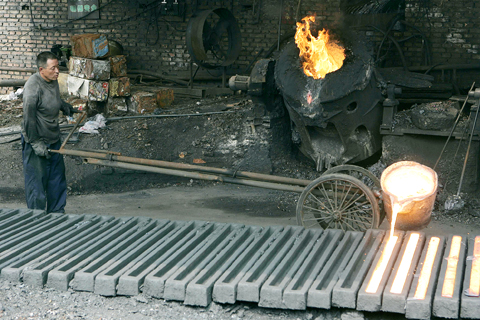A senior executive at mining company BHP Billiton says the way iron ore is priced should be more transparent, and that such a reform could help prevent situations like one that led to four Rio Tinto employees being arrested in China on commercial spying charges.
Alex Vanselow, chief financial officer of the world’s largest mining company, said BHP Billiton had been pushing for a market-based pricing mechanism for iron ore.
“Nobody asks us what the price of copper is every day or what the price of copper is expected to be 12 months from now,” Vanselow told Australian Broadcasting Corp television on Sunday.

PHOTO: REUTERS
“People just pull out their screens, look at the curve and they have a good idea. It should be no different for iron ore,” he said.
Iron ore prices are set in annual, secret talks between major suppliers, such as BHP Billiton and Rio Tinto, and customers such as China’s state-owned steelmakers. Prices of most other minerals, such as copper, are set by the market and fluctuate daily.
Negotiations on iron ore have proved contentious in recent years as demand soared, particularly in China, which is now seeking ways to win big price cuts.
China last week formally arrested four employees of Rio Tinto Ltd for infringing trade secrets and bribery, in a case that has strained relations with Australia because one of the suspects, Stern Hu (胡士泰), is an Australian citizen.
Hu, who headed Rio Tinto’s iron ore business in China, and his colleagues are accused of obtaining commercial secrets about China’s steel and iron industries through improper means.
They were detained on July 5, at a time when Rio Tinto was in contentious price setting negotiations with Chinese mills.
Vanselow said he could not comment on the circumstances of Hu’s case, “but I’m saying transparent prices is for everybody to benefit and creates a situation where this type of question wouldn’t even be possible.”
Meanwhile, China announced an iron ore supply contract yesterday with a smaller Australian miner in an apparent effort to prod global producers to accept lower prices in deadlocked contract talks.
Australia’s Fortescue Metals Group will sell China iron ore for US$0.94 per dry tonne, the state-sanctioned China Iron Steel Association announced.
That is below the price of US$0.97 agreed to with Japanese and South Korean mills for this year’s supplies and that major suppliers wanted Chinese mills to accept.
The Chinese association is deadlocked in price talks with the three major suppliers of global iron ore — Anglo-Australian miners Rio Tinto Ltd and BHP Billiton Ltd and Brazil’s Vale SA.
Beijing is pressing for deep reductions following two years of price hikes totaling more than 100 percent. A Cabinet minister said last week that China wanted more control over global prices given its status as the world’s largest iron ore consumer.
“The deal breaks the market impasse that had enveloped the Chinese iron ore industry and created uncertainty and risk,” Fortescue said in a statement issued in Australia.
Fortescue said the deal includes a pledge by the Chinese association to give the company priority in negotiating next year’s prices if annual talks are held. That could erode the influence of Rio, BHP and Vale in setting prices.
Employees who answered the phone at the association’s Beijing headquarters refused to give more details or transfer a reporter’s call to the group’s spokesman.

Authorities have detained three former Taiwan Semiconductor Manufacturing Co (TMSC, 台積電) employees on suspicion of compromising classified technology used in making 2-nanometer chips, the Taiwan High Prosecutors’ Office said yesterday. Prosecutors are holding a former TSMC engineer surnamed Chen (陳) and two recently sacked TSMC engineers, including one person surnamed Wu (吳) in detention with restricted communication, following an investigation launched on July 25, a statement said. The announcement came a day after Nikkei Asia reported on the technology theft in an exclusive story, saying TSMC had fired two workers for contravening data rules on advanced chipmaking technology. Two-nanometer wafers are the most

Tsunami waves were possible in three areas of Kamchatka in Russia’s Far East, the Russian Ministry for Emergency Services said yesterday after a magnitude 7.0 earthquake hit the nearby Kuril Islands. “The expected wave heights are low, but you must still move away from the shore,” the ministry said on the Telegram messaging app, after the latest seismic activity in the area. However, the Pacific Tsunami Warning System in Hawaii said there was no tsunami warning after the quake. The Russian tsunami alert was later canceled. Overnight, the Krasheninnikov volcano in Kamchatka erupted for the first time in 600 years, Russia’s RIA

South Korea yesterday said that it was removing loudspeakers used to blare K-pop and news reports to North Korea, as the new administration in Seoul tries to ease tensions with its bellicose neighbor. The nations, still technically at war, had already halted propaganda broadcasts along the demilitarized zone, Seoul’s military said in June after the election of South Korean President Lee Jae-myung. It said in June that Pyongyang stopped transmitting bizarre, unsettling noises along the border that had become a major nuisance for South Korean residents, a day after South Korea’s loudspeakers fell silent. “Starting today, the military has begun removing the loudspeakers,”

CHINA’s BULLYING: The former British prime minister said that he believes ‘Taiwan can and will’ protect its freedom and democracy, as its people are lovers of liberty Former British prime minister Boris Johnson yesterday said Western nations should have the courage to stand with and deepen their economic partnerships with Taiwan in the face of China’s intensified pressure. He made the remarks at the ninth Ketagalan Forum: 2025 Indo-Pacific Security Dialogue hosted by the Ministry of Foreign Affairs and the Prospect Foundation in Taipei. Johnson, who is visiting Taiwan for the first time, said he had seen Taiwan’s coastline on a screen on his indoor bicycle, but wanted to learn more about the nation, including its artificial intelligence (AI) development, the key technology of the 21st century. Calling himself an